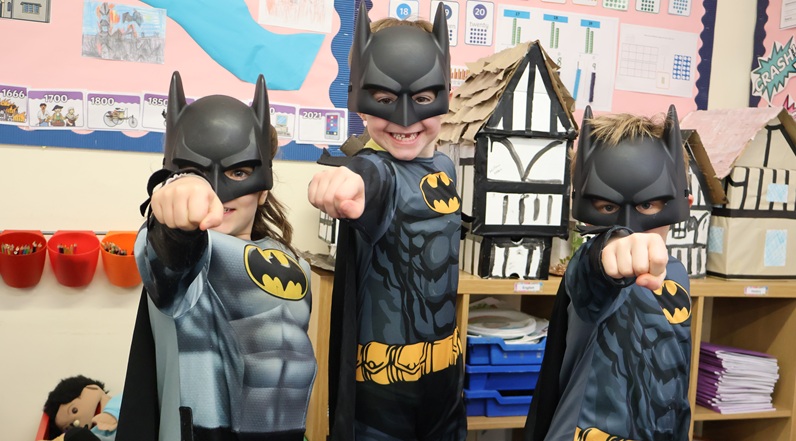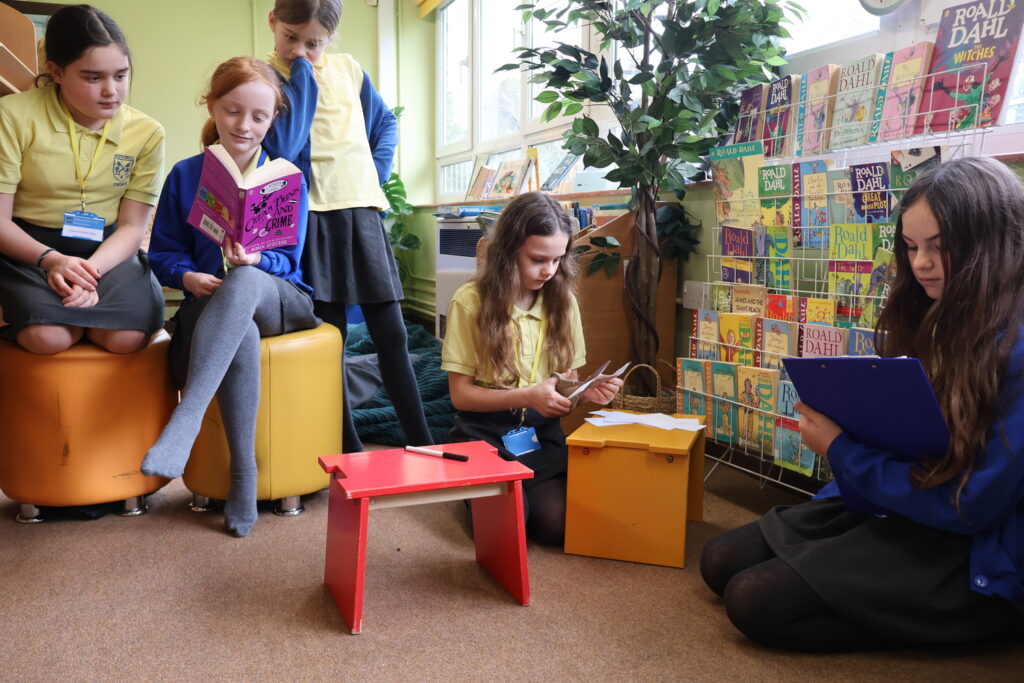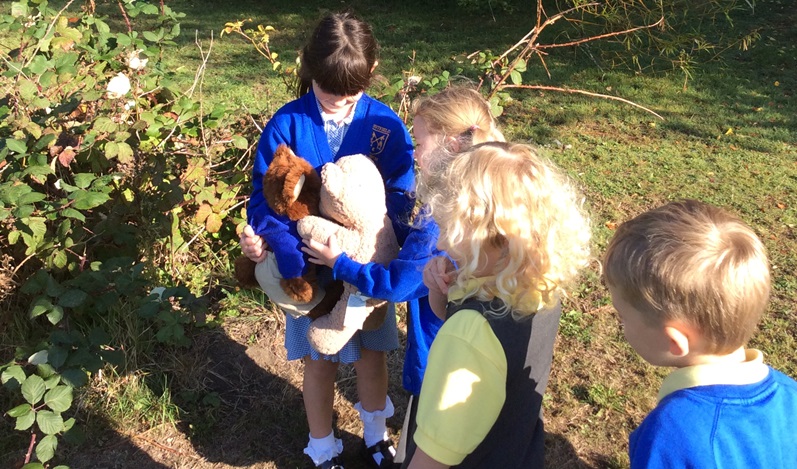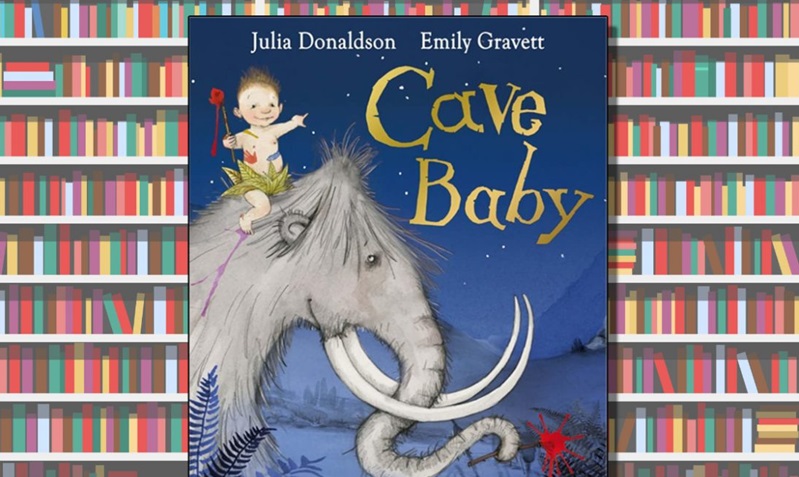Making sure that children become engaged with reading from the beginning is one of the most important ways to make a difference to their life chances, whatever their socio-economic background.
For this to happen, however, children need to learn to read as fluently as possible and be motivated to continue reading and talk about books brings particular advantages. Parents who engage their children in books prepare them to become committed and enthusiastic readers: they can transform their attitudes to reading. Their children learn to focus and share the enjoyment of all books, fiction and non-fiction.
Reading News
National Storytelling Week
Year 2 share stories with Reception
Year 1 Send for a Superhero
Lunchtime Library Club
Early Morning Bear Hunt!
Year 2 Reading
Year 5 Baseline Assessments
Year 1 Reading: ‘Cave Baby’
Phonics in Reception
I love the Library because…
Nutfield Church Primary School have a beautiful in-house library stocked with a plethora of books for the children to enjoy.
Here are a selection of quotes from our children telling us what they think about our library.
Books are amazing. You can learn so many new things by reading books.
KS1 Pupil - Theo
Books are great for reading excellent stories of course, but they are also full of fun activities.
KS1 Pupil
I love books because they help you to imagine wonderful things. Some books also give you great idas and tips so you get to make things as well as read!
KS1 Pupil - Elizah
I love the books. They have so many of my favourite things in them, including art!
KS1 Pupil
Book Related Talk
Also book-related talk introduces children to language that they might not hear in ordinary conversation, especially the vocabulary of the book itself.
At Nutfield Church Primary school, our aim is to encourage the love of reading on a daily basis in a variety of ways and to foster a life-long love of reading. Within our English learning, centred around the Literacy Tree Curriculum (Literacy tree), we base our work around a variety of books across the academic year. Throughout their time at school, your child will read a range of texts. These will be taught through a range of genres and cross-curricular writing opportunities, which include:
- Poetry
- Persuasive texts
- Narrative (Stories etc)
- Recounts
- Reports
- Explanations
- Instructions
We believe the exposure of quality children’s literature within the primary school setting is vital as a rich context for learning; not only within English as a subject but to support building a reading culture throughout the school. We use high quality books that offer opportunities for empathy and those which can aid philosophical enquiry, explore cultures, families, feelings and relationships. We inspire the love for reading in a variety of ways:
EYFS |
||||
| Individual Reading | Guided Reading | Shared Reading | Reading for pleasure/reading environment | Monitoring |
| In EYFS the children will read to an adult in school twice a week.
Once phonics is established, children should be reading at least every school night and a comment should be noted in their reading records. Children in vulnerable groups are identified by Leader and must read daily. Those children reading below age related expectations must read daily. Reading records are checked twice a week to ensure children are reading at home. |
Teachers make as many opportunities as possible within the curriculum where shared reading is encouraged.
Reading Buddies (every half term children read with a Buddy in another year group). |
Every classroom must have a book corner with a half termly foci linked to their learning.
Class book which is read at the end of each day for 10 minutes. Library led by a group of Year 5 and 6 library volunteers. Lunchtime reading club. Weekly library visit and children borrow a book. Book fairs. Reading volunteers. Poetry day Mystery Reader |
Every child has a reading record which is checked daily and children are encouraged to read at home.
Daily readers for those who have not met the required standard for their year group. Reluctant readers/vulnerable groups must read daily. |
|
KS1 |
||||
| Individual Reading | Guided Reading | Shared Reading | Reading for pleasure/reading environment | Monitoring |
| In Year 1 and 2, the children will read to an adult in school twice a week.
Children in vulnerable groups are identified by the teacher be heard reading daily. Those children reading below age related expectations must read daily. Reading records are checked regularly to ensure children are reading at home. |
In KS1 children spend 20 minutes a day taking part in a variety of English related tasks: a small group read with their teacher/TA learning how to answer questions about a text plus other reading based tasks and this will be part of a daily carousel. | Teachers make as many opportunities as possible within the curriculum where shared reading is encouraged.
Reading Buddies (every half term children read with a Buddy in another year group).
|
Every classroom must have a book corner with a half termly foci linked to their learning.
Class book which is read at the end of each day for 10 minutes. Library led by a group of Year 5 and 6 library volunteers. Lunchtime reading club. Weekly library visit and children borrow a book. Book fairs Mystery reader Poetry day. |
Every child has a reading record which is checked daily and children are encouraged to read at home.
Daily readers for those who have not met the required standard for their year group. Reluctant readers/vulnerable groups must read daily. |
KS2 |
||||
| Individual Reading | Guided Reading | Shared Reading | Reading for pleasure/reading environment | Monitoring |
| In Years 3, 4, 5 and 6, the children will read to an adult in school once a week.
Children in vulnerable groups are identified by the teacher be heard reading daily. Those children reading below age related expectations must read daily. Reading records are checked daily to ensure children are reading at home. |
In KS2 children will move onto a whole-class reading session where the session focuses on a particular reading skill ensuring that children secure these deeply. These sessions teach inference and deduction and help children to become critical readers.
Teachers follow the Literacy Leaves programme (Literacy Tree) and ensure that children are to use a mix of independent reading, paired and shared reading to cover the reading of the text. |
Teachers make as many opportunities as possible within the curriculum where shared reading is encouraged.
Reading Buddies (every half term children read with a Buddy in another year group). |
Every classroom must have a book corner with a half termly foci linked to their learning.
Class book which is read at the end of each day for 10 minutes. Library led by a group of Year 5 and 6 library volunteers. Lunchtime reading club. Weekly library visit and children borrow a book. Book fairs. Reading volunteers. Poetry day Mystery reader |
Every child has a reading record which is checked regularly and children are encouraged to read at home but as children moved into Years 5 and 6 then these become less of a focus and reading is recorded in the teacher’s reading folder.
Children in Year 3 should read weekly with an adult either on a 1-1 basis or in a small group read. Daily readers for those who have not met the required standard for their year group. Reluctant readers/vulnerable groups must read daily (at teacher’s discretion). |
How you can help at home:
Children will start to bring books home as they learn more GPCs (grapheme-phoneme correspondence) with a decodable books which includes only those they have learnt. As they progress they will also begin to learn ‘tricky words’ ie. those which do not follow a phonic pattern, for example – and, the or said, and these are taught separately alongside the phonemes they are learning. You can help your child to say the sounds correctly and then blend them to read. At Nutfield Church Primary School, teachers lead a phonics meeting in EYFS and Year One which will help you.
For more information, please see the English procedure on our website which has a list of the terminology you will need to know to help your child become a successful reader.
Mrs Cordey is our English Lead, please contact her through the school office if you have any questions, info@nutfield.surrey.sch.uk























































































